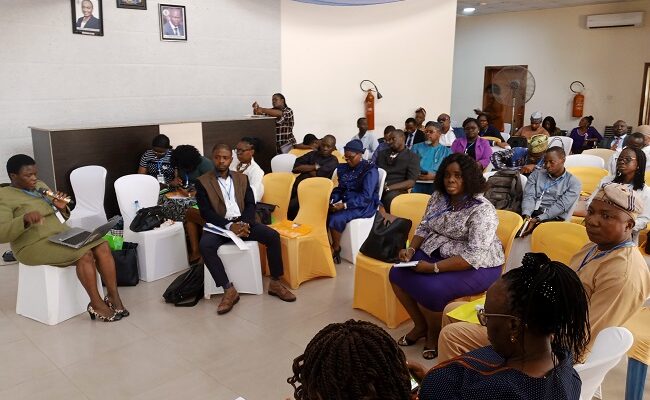Wale Akinselure
Daughter of the late sage, Ambassador Dr Olatokunbo Awolowo Dosumu has tasked African leaders to urgently take steps to stem the tide of too many Africans emigrating to countries where their skills are better appreciated, a trend popularly termed ‘japa’.

She said the call became more expedient than ever because Africa continued to lose, mostly youths, who possess the critical skills that the continent needed to develop and take her rightful place in the world.
Awolowo Dosumu, represented by Managing Editor/Editor-in-chief, African Newspapers of Nigeria Plc, Mr Edward Dickson, made this call while delivering the keynote address at the International Symposium on Digital Transformation and Public Service Delivery, held at the University of Ibadan School of Business, Ibadan, on Thursday.
“Too many Africans, mostly youths, mostly those that possess the critical skills that Africa needs to develop and take her rightful place in the world, are fleeing their home countries towards countries that appreciate their skills. African leaders need to take urgent steps to stem this tide,” Dosumu said.

To significantly improve the life and living of Africans, she tasked African governments to leverage digital transformation to improve public service thereby adding value to the life of the average African.

She held that Africa must deploy Artificial Intelligence (AI) to improve access to education by providing remote and low-cost learning options and personalised learning; develop precision agriculture techniques to improve crop yield, reduce waste and increase efficiency in resource use.
AI, she noted, should also be optimised for pest management, weather prediction, disease outbreak management, public health monitoring, diagnosis and treatment, medical records management, manufacturing, research and development and collaboration across borders.
To efficiently leverage the opportunities of digital technologies, she identified as critical a mental reset of the public service where public servants are made to understand that they are supposed to serve the public.
She added that African countries need to develop the capacity for digital transformation by investing in reliable and robust infrastructure, including broadband Internet, mobile networks and electricity, to ensure that people in remote areas have access to digital tools.
Also, she said African governments should promote digital literacy and digital skills development by investing in education and training programmes, supporting digital entrepreneurship and promoting digital innovation.
Critically, she noted that governments should provide incentives to startups, support incubators, accelerators and create regulatory frameworks that encourage competition.
The imperativeness of partnership was also identified with Awolowo Dosumu maintaining that African countries should increase access to financing, foster collaboration between public and private sectors to build capacity and identify gaps in digital transformation.
She stressed that governments should work with development banks and private sector partners to increase access to financing for startups and small businesses.
For the appropriate deployment of digital technology to improve the life and living of every African, she identified leadership as crucial.
She, however, noted that every African had a duty to ensure the emergence of the right leadership, in their various countries, that would create a properly oriented public service equipped with the ability to enunciate and implement appropriate policies.
Giving his remarks, Vice Chancellor, University of Ibadan, Professor Kayode Adebowale decried that the efficiency of the public/civil service is being hampered by a lack of legacy infrastructure.
Represented by the Dean, Faculty of Technology, Professor Isaac Bamigboye, the Vice Chancellor said Africa cannot continue to lag behind in terms of advancement hence application of digital technologies in public service had become imperative.
Setting the tone for the event, Dr Seun Kolade, who was chairman of the symposium said African countries must acknowledge that they must adapt digital technologies to optimise economic opportunities and engender sustainable development.
Though Kolade noted that the private sector had embraced the imperativeness of digital technologies, he decried the culture of resistance associated with the public sector.
He, however, noted that a strong political will, re-skilling and reorientation of the workforce in the public sector will help beat the enshrined resistance to change.
One of the resource persons at the symposium, Mr Segun Ajayi stressed that no government can succeed without deploying digital technologies to its workings and operation.
Ajayi, who is the Oracle Country Director, Nigeria, stressed that the nation cannot make appreciable progress if it continues with its manual, isolated workings.
The international symposium also featured group work and presentations on deploying digitisation in education, agriculture, healthcare, public service and the economy.
READ ALSO FROM NIGERIAN TRIBUNE








